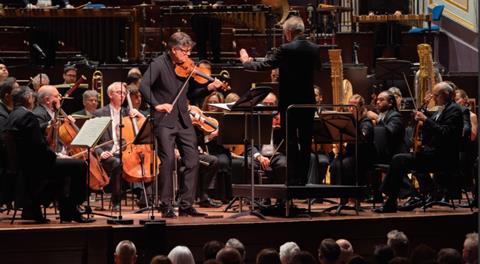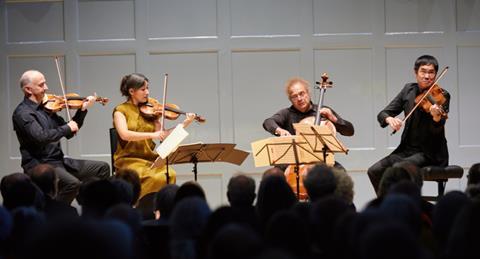David Kettle reports from the Edinburgh International Festival, where string works were much in evidence

Nicola Benedetti’s second year as Edinburgh International Festival director brought a greater sense of focus than 2023, but a few shaky issues remained. The festival’s theme of ‘Rituals that unite us’ seemed to run to little more than the ‘ritual’ of watching a live performance, and printed programmes with background notes had all but disappeared – a minor point, perhaps, but a bit baffling for a festival with inclusion high on its list of aims. Maybe concertgoers were supposed simply to respond emotionally and instinctively in the moment – which of course brings its own inevitable questions of interpretation.
And among another rich string roster, there were a few events that struggled to convince, too. Cellist Nicolas Altstaedt was an exceptionally fine soloist in Strauss’s Don Quixote with the European Union Youth Orchestra under Gianandrea Noseda: big-boned and gutsily vivid in his portrayal of Cervantes’s antihero, capturing the piece’s humour brilliantly with a thoroughly straight face. But why the audience was perched on beanbags rather than the Usher Hall’s conventional seats was something of a mystery – it’s a gimmick the festival appropriated from the Budapest Festival Orchestra, which visited last year, but in Hungary it’s done to allow listeners to sit in and among musicians. Not so in the Scottish capital.
Likewise, the young Kleio Quartet – winner of the 2023 Carl Nielsen Competition – gave a beautifully persuasive, perceptive account of Wynton Marsalis’s bluesy, down-and-dirty At the Octoroon Balls in the Queen’s Hall, swooping around its melodies and driving its foot-tapping rhythms. But the Haydn Quartet op.20 no.4 and the Britten Divertimenti that preceded the Marsalis felt rather too mannered and hard-pushed, as if the Kleio players were determined to stamp their mark on the music, no matter the cost.
Read: ‘I can’t help having a different perspective’ - Violinist Nicola Benedetti
Read: ‘It seemed like the Mount Everest of the repertoire’ - Nicolas Altstaedt on Dvořák’s ‘Dumky’ trio
It was undoubtedly a big ask for Roman Simovic – LSO leader and accomplished soloist – to stand in for an indisposed Hilary Hahn in the thorny, uncompromising 1963 Violin Concerto by Alberto Ginastera with the São Paulo Symphony Orchestra under Thierry Fischer. But he delivered a breathtaking performance, one that never shied away from the piece’s complexities and angular anguish, instead conveying them with forensic precision and unwavering conviction. He almost transformed into another player entirely, however, for the Waxman Carmen Fantasie that followed, displaying a gleeful showmanship in its lavish portamentos and hair-raising technical demands. Best of all, he clearly loved every second; a sense of joy and fun that radiated out from the stage.

The Takács Quartet offered a far soberer, almost aristocratic approach to Haydn and Schubert in its morning recital at the Queen’s Hall. Its account of the former’s ‘Sunrise’ Quartet (op.76 no.4) was impeccably crafted, deeply considered and exquisitely delivered, with abundant glances and cues between players adding to a sense of warm, assured ensemble. And the Schubert G major Quartet D887, assumed a noble, stiff-upper-lip perspective on the composer’s final work for the medium, one that revelled in the piece’s expansiveness while never seeming ponderous, but also conveying the composer’s more desperate outbursts with a sense of grace and acceptance.
In between, however, Flow by US violinist–composer Nokuthula Ngwenyama brought out the Takács’s colourful, groovy side, with the players conjuring 1970s-style pop and glittering sound worlds, all with complete conviction and no lack of persuasiveness. It’s no surprise that Ngwenyama wrote it specifically for the group: the musicians clearly adore the piece, and know its intricate corners and its esoteric textures intimately. If there was a sense that Flow was more a catalogue of ideas (even something of a live concept album) than a fully formed, rigorously structured unity, that was swept aside by the joy of this performance.
Talking of joy, that was an emotion found in abundance in the concert given by young Cardross-born fiddler Ryan Young, somewhat hidden away over on the Fringe at Newington café Lady and the Bear (ironically just round the corner from the far more prominent Queen’s Hall), with spirited accompaniment from Ullapool guitarist Gillie O’Flaherty. Young is a disarmingly direct performer, recounting tales of life on the road with sometimes awkward honesty, and with a playing style that’s just as raw and sincere. His Scottish trad tunes were shot through with deep emotion, and traversed in a deeply idiosyncratic way with swooping portamentos and sometimes scratchy bowings that seemed to hint at barely concealed meanings. He might have a tendency to bring tunes together in extreme accelerandos, from heartrending, tear-jerking melodies taken at a sometimes glacial pace through to stomping, helter-skelter reels and jigs that had him and O’Flaherty struggling to keep up with their frenzied foot-tapping. But, as festival-goers stopped to peer through the café’s windows, Young seemed to sum up the best of the bigger festival’s freewheeling, sometimes anarchic spirit, in a concert that was as soulful as it was electrifying.
Read: 50 years of the Takács Quartet
Read: The best seat in the house is a bean bag: 48 hours at the Edinburgh International Festival
The number one source for playing and teaching books, guides, CDs, calendars and back issues of the magazine.
In The Best of Technique you’ll discover the top playing tips of the world’s leading string players and teachers. It’s packed full of exercises for students, plus examples from the standard repertoire to show you how to integrate the technique into your playing.
The Strad’s Masterclass series brings together the finest string players with some of the greatest string works ever written. Always one of our most popular sections, Masterclass has been an invaluable aid to aspiring soloists, chamber musicians and string teachers since the 1990s.
The Canada Council of the Arts’ Musical Instrument Bank is 40 years old in 2025. This year’s calendar celebrates some its treasures, including four instruments by Antonio Stradivari and priceless works by Montagnana, Gagliano, Pressenda and David Tecchler.













































No comments yet